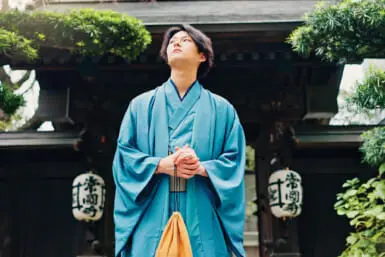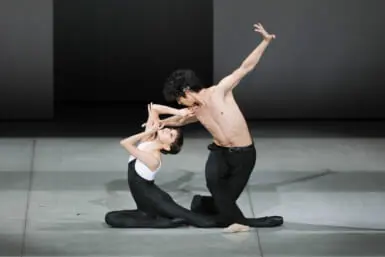by Denny Sargent
Those familiar with Japanese art will recognize this scene: a small group of courtly Japanese sit on a blanket in a peaceful, natural setting— maybe on a grassy hill or by a lake. They all seem to be entranced by a beautiful, clear full moon as they sip drinks and nibble on snacks. One can imagine the conversation is in whispers or nonexistent as they all share this poetic moment.
This scene, repeated over and over again in all kinds of artistic mediums, forms the essence of the very private Japanese festival known as Tsukimi, literally “moon viewing.”
Though most people in modern Japan cannot easily recreate the serene, natural setting described above, moon-viewing parties are still a commonly held occurrence all over this country, even in a congested metropolis like Tokyo. Though we may be missing the sighing of the wind through the trees or the sound of a distant brook, we can still become entranced by the magic and mystery of the autumn moon, even through the window of a small apartment.
Most will tell you that Tsukimi is not a religious festival, but it probably once was a yearly dedication and offering to the Japanese moon goddess, Tsukiyomi no Kami. She is the sister of Amaterasu-Omikami, the more famous Japanese Sun Goddess from whom the Imperial Family is said to be directly descended.
Both of these goddesses were said to have been bom from the eyes of the creator god Izanagi, from the right and left eyes respectively, but whereas the Sun Goddess became the supreme deity in Shinto, the moon goddess (who was said to have been awarded the land Unabara [possibly Korea] as her domain), faded from importance in the “Land of the Rising Sun.”
People in the West tend to refer to “the man in the moon” and see in this celestial orb a smiling face. In Japan, the image everyone imagines is of a rabbit making mochi (as opposed to green cheese!), and there is a legend that explains why the rabbit is there.
Once, long ago, the spirit of the moon came to earth in the form of an old man. He came upon several animals and begged them for food. The fox offered fish and the badger fruit, but the rabbit had nothing to give, so he had the other animals build a fire and he offered himself to the man for supper!
The old man then revealed himself as the moon kami and rewarded the rabbit by bringing him up to the moon to reside there forever. This is why it’s common to find tea sets, toys and hangings depicting the lunar rabbit displayed at Tsukimi parties.
Traditionally, the chushu no meigetsu (harvest moon) is said to be the most beautiful moon in the yearly cycle, so this festival is always held sometime in the middle of September. Due to the nature of this event, the actual date is up to each person or family and, of course, a cloudy night is to be avoided at all costs.
A few temples and parks will hold Tsukimi nights at various times, but a majority of Japanese celebrate this festival in their home.
The preparations are artistic, but not especially difficult. A special ikebana (flower arrangement) is made featuring susuki (pampas grass) and other fall flowers and plants. If you wish to be a real stickler for tradition, the “seven grasses of autumn” are supposed to be displayed, but you may have difficulty finding all these in a flower shop or even finding someone who remembers what they all are!
Every festival seems to have a special kind of food, and Tsukimi is no exception. Along with the ikebana, a plate of dango (rice-flour dumplings) is displayed as a kind of offering to the moon. Other foods such as chestnuts, cooked seasonal vegetables and fall fruits are often laid out as well, and sake, beer and/or ocha usually complete this special lunar feast.
What do you do when you have everything assembled by the open window in the silvery moonlight? You relax and, much as the ancient Japanese mentioned at the beginning of this article, you contemplate the wonders of the moon in quiet harmony with those you love, be they friends, family or lovers.
The food is slowly consumed, the drinks are quietly sipped and, if the mood takes you, poetry is spontaneously composed and shared.
Though worship of the moon goddess in Japan has all but faded from memory, participants in Tsukimi still feel inspired and become entranced by her lunar power, if only for one relaxing evening. Everyone should take time out from the cares and tensions of the busy day to pause for a short time and enjoy the dreamy pleasure of moon-viewing.








